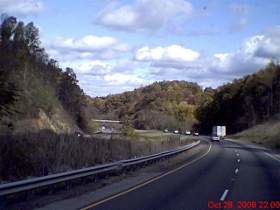Freezing Diesel
Topic 6736 | Page 1

Glad you're OK buddy. I'll be thinking of you.
I heard another driver mention that he adds it around 15 degrees or colder.
Before adding anything to the fuel make sure you at least consult your mechanics at the shop. Some companies have fuel tank heaters in their trucks and others have equipment that isn't too fond of certain diesel additives. I've driven for companies that told you not to put additives in the fuel.
That being said, if you're going to put in additives it's usually in the single digits or close to zero that you would do so. Any temps above that should be fine. Once that fuel gels up you have a huge mess though. It doesn't "unfreeze" or "ungel" when it warms up. It has to be removed from the tanks and the filters and lines have to be drained.
That's a huge bummer Attila! I feel for ya. Hopefully they'll get you up and running before too long.
Diesel gels at 17 something degrees, so I add antigel at 19. Cummins engines without the new modification get a bottle and a half per tank. I add a bottle per tank every time I fuel if the temp is twenty or below, and/or forecasted to go that low that night, so the concentration is pretty high. I have a Cummins as well. Company pays for my antigel so no big deal for me. I just picked up a case of twelve as a matter of fact.
Diesel gels at 17 something degrees
Maybe without the additives the fuel companies put in it for winter time. But think about it....if diesel gelled at 17 degrees you'd have tens of thousands of trucks disabled every time the temp hit 10 degrees. I just don't want people panicking every time it hits 20 degrees that they're about to freeze up. They're not.
How much anti-gel would you put in if you run half a tank all the time? I can't go much more than 5/8 otherwise I go overweight on my steers.. (5th wheel is at the last hole in the rear.) Our trucks are a little longer so our weight distribution is a bit different then other trucks. Just currious

Last winter in MN and ND besides using an Anti Gell I would use #1 Diesel that they have up there. I seen -35 Below on my outside air temp gage, actual, not wind chill ! Another tanker driver from my company, Froze up in Williston, left the truck running all night as he spent the night in a motel. Took 3 days before some one had room to tow him into a heated shop, after many problems it took him 10 days to get home to Chicago. FYI, or trucks were 2014 Freightshakers (Penksi lease) they have California CARB certs, so they only Idle 5 minutes and shut off,,,,,, we would cheat and put on the high idle (1500) PTO switch to run all night. The problem with these new trucks is after about 6 hours it would start flashing Regen needed now,,,, If you weren't there to catch it, then it would shut off and could freeze up or have gone into Limp mode and require a trip to the Dealer,,,,, DEF and ReGen= PITA

Thanks for the advice, big rookie mistake there. I always thought antigel was just a gimmic sold at truck stops. Won't make that mistake again. Got the truck towed to a warm shop, they seemed confident on getting me OTR by tomorrow afternoon. It was the diesle gelling up too. They also advised me not to set the trailer breaks when it gets this cold, they tend to lock up. Lessons learned.
OTR:
Over The Road
OTR driving normally means you'll be hauling freight to various customers throughout your company's hauling region. It often entails being gone from home for two to three weeks at a time.

Diesel gels at 17 something degrees
Maybe without the additives the fuel companies put in it for winter time. But think about it....if diesel gelled at 17 degrees you'd have tens of thousands of trucks disabled every time the temp hit 10 degrees. I just don't want people panicking every time it hits 20 degrees that they're about to freeze up. They're not.
So I have a little history on this. I make biodiesel and have learned and experienced alot with this. Normal diesel at the pump has a pour point (gel) at about -15F. If you buy diesel with a mix of biodiesel it will lower the gel point to around 0-10F. The diesel once it goes solid will not liquify until 30-40F. But similar to what Bret has mentioned the fuel because of all of the additives becomes junk or will make your engine performance very poor until you do get it out of your system. My personal truck (Ram 3500) underwent this when i lived in NM and the temp held at -15F for almost 2 weeks. I could not get the truck started and had to pull it into my shop and let it warm up to get it out of my truck. Replaced the fuel filter and drained the tank. She was a little cranky until i got new fuel into her. If you are not using anti-gel additive and know you are headed into severe weather like this call your company and get some input first. You were lucky that you did not experience hyperthermia. It can kill you in matter of 2 hours or less at the temperatures you are speaking of. For the rest of you out there please use caution and be fully prepared. I lost a friend this way and was the one that did the recovery. Very hard.
With regard to engines, today's diesels are more sensitive to fuels and with all of the advances in technologies makes this a challenge. But, if you are buying the antigel read the label first before you use it or better yet consult your company mechanics. For the most part these antigels are tested on multiple makes of diesel engines before it is released for use. Buying from a reputable manufacturer is also a plus as well. Hope it all turns out well for you and back on the road soon. To all Happy New Year and stay warm.
EPU:
Electric Auxiliary Power Units
Electric APUs have started gaining acceptance. These electric APUs use battery packs instead of the diesel engine on traditional APUs as a source of power. The APU's battery pack is charged when the truck is in motion. When the truck is idle, the stored energy in the battery pack is then used to power an air conditioner, heater, and other devices
Attila, some things we just learn the hard way. I made the same mistake as you so now I'm all over it so it won't happen again. Last winter I didn't put anti-gel in my reefer and it shut off at -25 degrees. I was outside for 30 minutes with a frozen mustache priming the engine. That was a nightmare experience I will never forget. So that's why I play it safe now when using anti-gel. I swing by a terminal and pick up a couple of bottles, it doesn't cost me a penny so why not?
As long as you learned you're lesson you can move on. Everyday is a learning experience, some learning experiences are just more harsh than others.
Terminal:
A facility where trucking companies operate out of, or their "home base" if you will. A lot of major companies have multiple terminals around the country which usually consist of the main office building, a drop lot for trailers, and sometimes a repair shop and wash facilities.
Reefer:
A refrigerated trailer.
New Reply:
New! Check out our help videos for a better understanding of our forum features

















Preview:
This topic has the following tags:
Equipment Questions Life On The Road Truck Driver Safety







 TT On Facebook
TT On Facebook
Well sitting in a hotel right now. Temp here in Nebraska dropped to -20°. Truck started acting up, losing power more and more. Ended up on a off ramp, truck dead, no bunk heater and no cell connection. QualComm working though thank goodness. Took awhile to get the company on the same page but they realized how serious the situation was. Got the cops out there to pick me up a few hours later. I was cold as hell, wrapped up like that little kid that couldn't stand up on The Christmas Story. Police dropped me off at the hotel. Police told me I did the right thing, windchill was expected to get in the -30's or worse. Not sure what happened to the truck, I go get it towed tomorrow. Have a feeling the diesle froze up though. Did not add the additive. What temp do you guys usually prime your diesle at?
Qualcomm:
Omnitracs (a.k.a. Qualcomm) is a satellite-based messaging system with built-in GPS capabilities built by Qualcomm. It has a small computer screen and keyboard and is tied into the truck’s computer. It allows trucking companies to track where the driver is at, monitor the truck, and send and receive messages with the driver – similar to email.